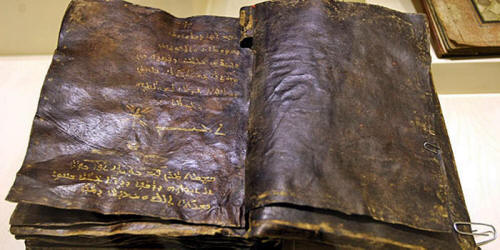|
Many people have been circulating this supposed "news," which isn't new at all. Nor is the Vatican "shocked" by an old Syriac Bible purportedly from 1,500 years ago.
There is nothing new in the Bible that the Vatican's scholars and other experts have not known about for the past 18 centuries or so.
To begin with, Christian apologists rebut that the so-called 'Ankara Bible' evidently is not 1,500 years old but may date from 1500 AD/CE at the earliest, while also contending that the book may be a "forgery."
In reality, this particular book may not be as ancient as is claimed, but its doctrines were not fabricated at that time.
Indeed, the Ankara Bible's "strange" doctrines of Jesus not being crucified and other peculiarities are simply a rehash of one of the many strains of Christianity that thrived from the second century AD/CE onward.
This Syrian-Arab Christian perspective thus has been around for many centuries, since antiquity, based on the apocryphal Gospel of Barnabas and other such non-canonical texts.
The contents of the Gospel of Barnabas include the following:
The 'name' Muhammad
As concerns the claim that Barnabas "names" Muhammad/Mohammed, that 'title' simply means "praised" or "praiseworthy," so any book that includes the Arabic word for "praiseworthy" as an epithet could be said to be "predict Mohammed."
In other words, "Mohammed" is simply a title that could be applied to many people and probably was, long before a historical Mohammed supposedly existed.
In this regard, it is also claimed that the name "Mohammed" was included in the Hebrew Bible or Old Testament/Tanakh, at Song of Songs 5:16, which represents a love song about the singer's "beloved":
The Hebrew word here for "desirable" is מחמד machmad, a term Muslim apologists contend is the "prediction" of Mohammed as well.
Neither the Bible nor the Barnabas gospel "predicts Mohammed," however.
If anything, Mohammed is a fictional compilation of characters, and Song of Songs 5, the Barnabas gospel and other apocryphal texts were used to create him, as was done with Moses and Jesus before him.
In reality, the ideas in Barnabas evidently were used to create Islam, which includes the book's heretical doctrines in the Quran. In the end, the gleeful recent touting of this Bible and Gospel basically represents Muslim propaganda.
Again, there were MANY different strains of Christianity beginning in the second century.
That's one very big clue that we are talking about a MYTH.
...Predicts The Coming of Prophet Muhammad
Related
from TML Website
Seems this stuff comes up every week, but this picture is apparently that of an alleged 1500 year old Bible that is now being kept in Ankara.
The story is that Turkish police seized it in an anti-smuggling operation in 2000. It is only now coming to light because the Vatican is asking for it. It apparently contains the Gospel of Barnabas, which scholars almost unanimously date to the 16th century as a late pseudo-gospel that was written to give the impression that it was the work of Barnabas.
Why is this gospel so potentially valuable to Turkey?
It contains within it some material that seems to predict the coming of Mohammed, and generally follows the standard Muslim account of early Christianity.
So if Turkey can prove it is from 500 AD it obviously scores a huge point since Mohammed doesn't come until the end of that century, and thus the book would clearly be a prophecy about his coming.
Lots at stake then, and no surprise the Turkish authorities are not so readily handing it over to the Vatican and are instead keeping it under military control.
It is admittedly tough to read, but it would quite a mistake to claim it is 1500 years old when it was produced in 1500. This date would also conform to what most scholarship believes anyway, that this gospel was produced around this time.
Please do chime in if you have a better read on this, but I think this is another phony.
UPDATE:
Another colleague just wrote:
Anyway, this is interesting but read it with discernment:
|


May 5, 2014
from FreeThoughtNation Website